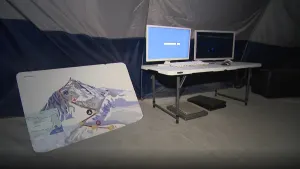More Stories
Demolition began on the Seth Boyden housing complex on Thursday. It was the first major federal low-income housing project building in Newark after the Great Depression.
The buildings have been vacant for several years, and now the city is making way for a new development.
Mayor Ras Baraka manned the excavator as it took the first ceremonial chunk out of the complex.
“Everything goes for us today – everything. All the memories, all the loved ones that we lost down here. We lost a lot of ones down here,” says Myra Vazquez.
Vazquez was born and raised at the complex and has moved onward and upward. But she and other former residents came by the complex to watch it be torn down.
Built in 1941, the 530-apartment complex was one of the first massive federally financed public housing projects that would, in many ways, come to define Newark. Newark was nicknamed “The Brick City” because of the Seth Boyden projects.
One former resident after another described a mix of heavy emotions. Happiness for the fond memories they had of growing up in the complex. And sadness for those whose lives were claimed or derailed by the drugs and violence that eventually took hold.
“The people were afraid to come. But to us, this was home. This was family,” one former resident says
Those who lived at Seth Boyden also express gratitude for having outlasted the place itself, for having survived and made stronger for having lived there.
“I always considered myself a privileged projects kid. It gave me my grind. I’m doing very well for myself having come from here,” says Lavinia Greene.
Former Newark Mayor Sen. Cory Booker used to like to say that the term “Brick City” really reflects Newark’s residents – strong, resilient and enduring.
Mayor Baraka says that this is the next chapter in Newark’s evolution.
“We want to revitalize, repurpose, transform this whole neighborhood,” Baraka said.
But as those who grew up at Seth Boyden gathered souvenir bricks to take home, it became clear what they were really there to commemorate – survival.
“We are survivors. I don’t think you all understand, man. A lot of us, for where we lived, we weren’t supposed to make it this far, because that’s what they expect this type of atmosphere to do to people like us. But we made it,” a former resident said
More from News 12
1:31

What's Cooking: Uncle Giuseppe's Marketplace's prime rib roast
1:30

Looking for a road trip? Check out Big Snow at American Dream in East Rutherford
1:27

What's Cooking: Uncle Giuseppe's quiche lorraine
2:34

Guide: Safety tips to help prevent home burglaries
2:19

Guide: Safety measures to help prevent fires and how to escape one
2:36
